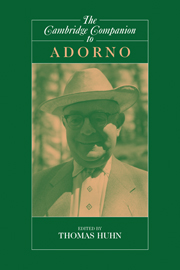Book contents
- Frontmatter
- Introduction: Thoughts beside Themselves
- 1 Negative Dialectic as Fate
- 2 Weighty Objects
- 3 Adorno, Marx, Materialism
- 4 Leaving Home
- 5 Is Experience Still in Crisis? Reflections on a Frankfurt School Lament
- 6 Mephistopheles in Hollywood
- 7 Right Listening and a New Type of Human Being
- 8 Authenticity and Failure in Adorno’s Aesthetics of Music
- 9 Dissonant Works and the Listening Public
- 10 Adorno, Heidegger, and the Meaning of Music
- 11 The Critical Theory of Society as Reflexive Sociology
- 12 Genealogy and Critique
- 13 Adorno’s Negative Moral Philosophy
- 14 Adorno’s Social Lyric, and Literary Criticism Today
- 15 Adorno’s Tom Sawyer Opera Singspiel
- Select Bibliography
- Index
12 - Genealogy and Critique
Two Forms of Ethical Questioning of Morality
Published online by Cambridge University Press: 28 May 2006
- Frontmatter
- Introduction: Thoughts beside Themselves
- 1 Negative Dialectic as Fate
- 2 Weighty Objects
- 3 Adorno, Marx, Materialism
- 4 Leaving Home
- 5 Is Experience Still in Crisis? Reflections on a Frankfurt School Lament
- 6 Mephistopheles in Hollywood
- 7 Right Listening and a New Type of Human Being
- 8 Authenticity and Failure in Adorno’s Aesthetics of Music
- 9 Dissonant Works and the Listening Public
- 10 Adorno, Heidegger, and the Meaning of Music
- 11 The Critical Theory of Society as Reflexive Sociology
- 12 Genealogy and Critique
- 13 Adorno’s Negative Moral Philosophy
- 14 Adorno’s Social Lyric, and Literary Criticism Today
- 15 Adorno’s Tom Sawyer Opera Singspiel
- Select Bibliography
- Index
Summary
Any adequate understanding of morality includes its critical questioning. Critical questioning of this sort looks on morality from the outside, for it views morality as a necessarily limited perspective on our life as a whole. One can therefore characterize this questioning as an “external” reflection on morality. At the same time, however, it would be a misconception of the critical questioning of morality to view it as solely external, for it might then too readily result in a rejection, or even a dissolving, of morality. What leads to this misconception is the overlooking of the fact that the external stance is at the same time linked to a self-questioning of morality: The questioning of morality from the outside has its foundations in morality itself. For viewed correctly, morality is constituted such that it contains that which at the same time it is in conflict with from the outside. Objects thus composed may well be called “dialectical.” Part of any adequate self-understanding of morality is therefore the examination of the dialectic, or, more precisely, what Adorno would call the negative dialectic, of morality.
- Type
- Chapter
- Information
- The Cambridge Companion to Adorno , pp. 302 - 327Publisher: Cambridge University PressPrint publication year: 2004
- 5
- Cited by

